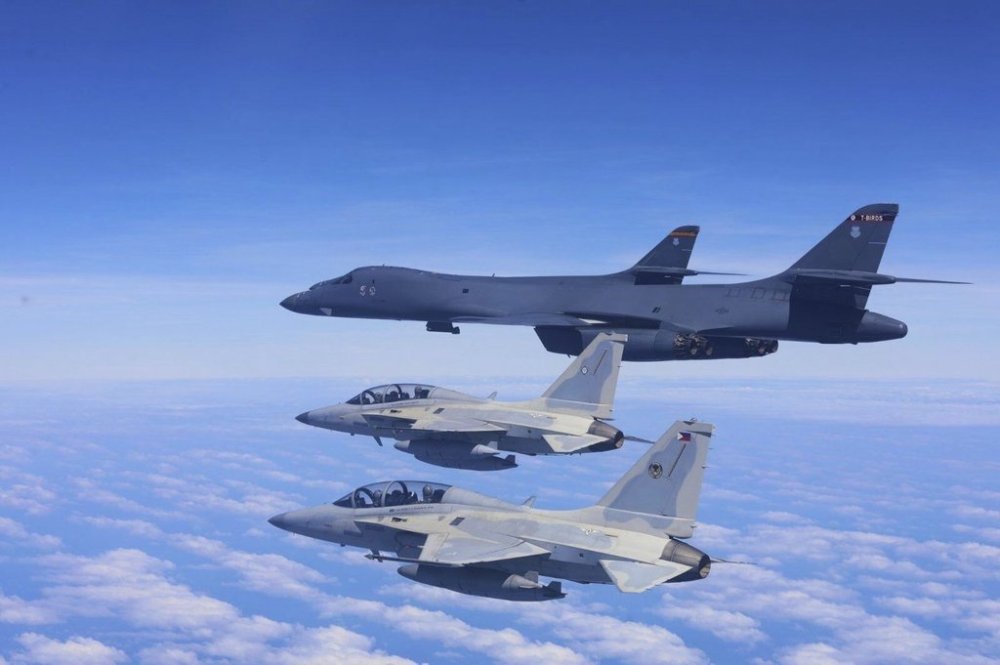A flurry of international naval drills around the Philippines prompts complaints from Beijing
Advertisement
Read this article for free:
or
Already have an account? Log in here »
To continue reading, please subscribe:
Monthly Digital Subscription
$0 for the first 4 weeks*
- Enjoy unlimited reading on winnipegfreepress.com
- Read the E-Edition, our digital replica newspaper
- Access News Break, our award-winning app
- Play interactive puzzles
*No charge for 4 weeks then price increases to the regular rate of $19.00 plus GST every four weeks. Offer available to new and qualified returning subscribers only. Cancel any time.
Monthly Digital Subscription
$4.75/week*
- Enjoy unlimited reading on winnipegfreepress.com
- Read the E-Edition, our digital replica newspaper
- Access News Break, our award-winning app
- Play interactive puzzles
*Billed as $19 plus GST every four weeks. Cancel any time.
To continue reading, please subscribe:
Add Free Press access to your Brandon Sun subscription for only an additional
$1 for the first 4 weeks*
*Your next subscription payment will increase by $1.00 and you will be charged $16.99 plus GST for four weeks. After four weeks, your payment will increase to $23.99 plus GST every four weeks.
Read unlimited articles for free today:
or
Already have an account? Log in here »
Hey there, time traveller!
This article was published 06/02/2025 (269 days ago), so information in it may no longer be current.
TAIPEI, Taiwan (AP) — A flurry of naval drills surrounding the Philippines involving the United States and its partners has prompted complaints from Beijing, which claims the entire South China Sea and accuses Manila of colluding with others to destabilize the region.
The U.S. 7th Fleet based in Japan said forces from Australia, Japan, the Philippines, and the U.S. conducted a “multilateral Maritime Cooperative Activity” within the Philippines’ Exclusive Economic Zone on Wednesday.
Such drills “strengthen the interoperability of our defense/armed forces doctrines, tactics, techniques, and procedures,” the fleet said in a news release. The maneuvers were taking place within the Philippines’ zone, but the fleet gave no details on the exact location.

More exercises involving the U.S., Japan and France were planned for later this week in the Philippines Sea, which China does not claim.
That exercise “is designed to advance coordination and cooperation between French, Japanese and U.S. maritime forces while simultaneously demonstrating capabilities in multi-domain operations,” the fleet said.
The U.S. aircraft carrier Carl Vinson, French carrier Charles De Gaulle and Japan’s Izumo-class multi-functional destroyer Kaga will take part in the drill starting Saturday, along with their escorts and air wings, the fleet said.
France’s participation is especially significant because of the distance from its home base, 6,000 kilometers (3,700 miles) away in Toulouse, commander of the Carrier Strike Group Rear Adm. Jacques Mallard was quoted as saying.
Meanwhile, Tian Junli, spokesperson for China’s Southern Theater Command, accused the Philippines of “colluding with outside countries to organize ‘so-called joint patrols’, ” which he said ”destabilize the region,” Chinese state media said on Thursday.
Tian said the Philippines actions were “an attempt to endorse its ‘illegal claims’ in the South China Sea and ”undermine China’s maritime rights and interests.” He specifically pointed to U.S.-Philippines joint patrols on Tuesday and said China had carried out its own patrols in the region on Wednesday.
China is one of six regional powers that claims the strategic South China Sea in part or in whole, ignoring a ruling by a United Nations-backed court that tossed out most of its claims and building human-made islands equipped with airstrips and other infrastructure of military use. China’s coast guard and maritime militia frequently clash with ships from fellow claimants Vietnam and the Philippines.
Though it claims not to disrupt shipping or overflights in the sea, through which an estimated $5 trillion in global trade transits each year, China is adamantly opposed to foreign military shipping in the area.
The waterway is also believed to be sitting atop vast undersea deposits of oil and gas and while China says it wants to come to a negotiated agreement about the use of the sea, such efforts have made little progress.
China says the U.S. and other countries that don’t border on the sea should have no say in affairs concerning it, although the U.S. — which takes no formal stand on sovereignty issues involving the sea — has maintained bases and alliances in the region long before China made its formal claim to sovereignty using the so-called “eight dash line.”
Beijing is especially angered over U.S. “freedom of navigation operations” in which Navy ships sail close to Chinese-held maritime features to show Washington does not recognize China’s sovereignty claims.

